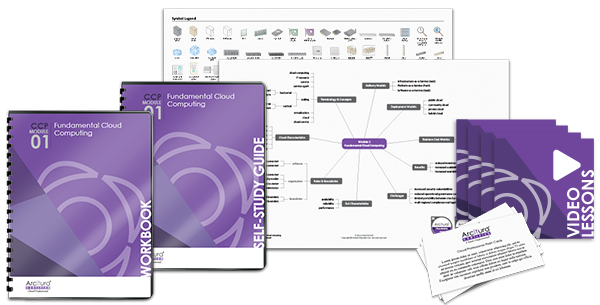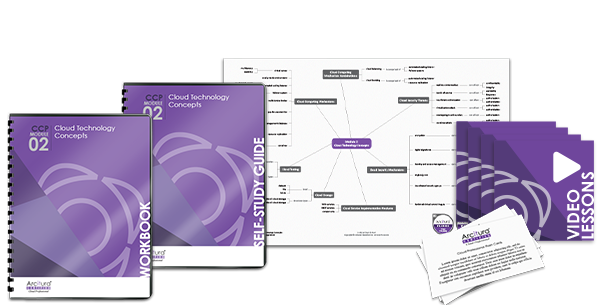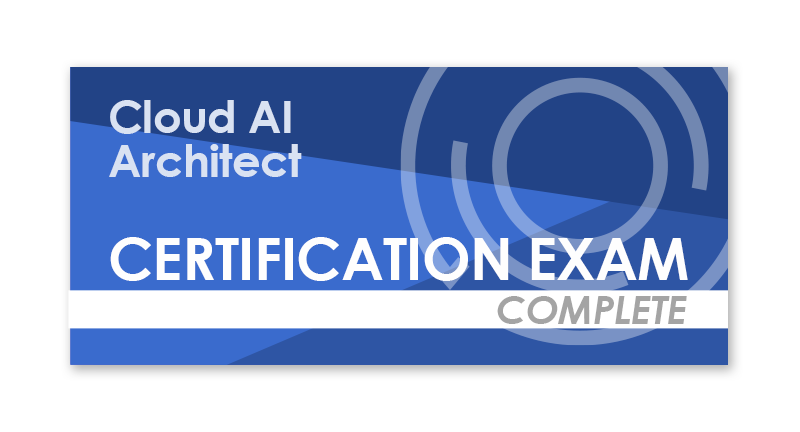Cloud AI Architecture & Design/Cloud AI Architect (Complete Course/Bun (original) (raw)

Note: This new course is coming soon and is currently available for pre-order.
The Cloud AI Architecture & Design course covers the technology architecture of cloud-based AI systems, including cloud automation and infrastructure relevant to AI processing, serverless architectural models for AI, AI system monitoring, logging and auditing, AI in multi-cloud and hybrid architectures, as well as AI-related cloud services and infrastructure models.
Complete the Cloud AI Architecture & Design course and, optionally, get accredited as a Certified Cloud AI Architect by passing the certification exam. You can purchase the course now and get the exam later, or you can get them together at a discount as part of the Certification Bundle.
Upon completing the course you will receive a digital certificate of completion, as well as a digital training badge from Acclaim/Credly. Because this course encompasses multiple certifications, upon passing the exam you will also receive official Cloud Professional, AI Professional, Cloud AI Professional and Cloud AI Architect digital accreditation certificates and certification badges from Acclaim/Credly, along with an account that can be used to verify your certification status.
If you already completed the Cloud AI Technology & Automation course, you can purchase a partial course (or a partial bundle) with only the modules specific to the Cloud AI Architect track here.
The Cloud AI Architecture & Design course is comprised of the following 7 course modules, each of which has an estimated completion time of 10 hours:
Cloud Computing School
- Module 1: Fundamental Cloud Computing
- Module 2: Cloud Technology Concepts
AI & Cloud AI Professional Academy
- Module 1: Fundamental Predictive AI
- Module 4: Fundamental Generative AI
- Module 19: Cloud AI Technology & Automation
- Module 20: Cloud AI Architecture & Design
- Module 21: Cloud AI Architecture & Design Lab
Choose the Certification Bundle to receive the entire course together with the online-proctored certification exam and a set of practice exam questions, all at a bundle discount.
Upon purchasing this course, you will automatically receive access via the Online Interactive eLearning platform. To provide you with the greatest flexibility, you will also have the option to access the course materials via two additional eLearning formats, at no extra cost. All three eLearning formats are briefly described below. A more detailed comparison can be found here.
- For everyday learning: An online interactive eLearning platform with individual lessons, as well as interactive and automatically graded exercises and practice questions.
- For learning on-the-go: A study kit platform with access to full course documents that support online/offline synching, annotations, comments, custom bookmarks and cross-document searches.
- For your reference: A set of printable watermarked PDF documents that you can keep (for all course workbooks and posters). All three forms of access are subject to Arcitura’s *Lifetime Access Guarantee. Upon purchase, access to the online interactive eLearning platform (1) is provided within one business day. Access to the study kits (2) and the PDF documents (3) is provided upon request.
The course is comprised of a set of modules. Each module has a set of lessons and is further supplemented with exercises to help reinforce your understanding of key topics. Shown below are the digital contents and the topic outline for each course module:
Module 1: Fundamental Cloud Computing
This course module provides end-to-end coverage of fundamental cloud computing topics as they pertain to both technology and business considerations. The module content is divided into a series of modular sections, each of which is accompanied by one or more hands-on exercises.

Course Module Contents
- Workbook Lessons (100+ pages)
- Video Lessons (for all topics)
- Interactive Exercises
- Mind Map Poster
- Symbol Legend Poster
- Practice Exam Questions
- PDFs of Workbook and Posters (printable)
Topics Covered
- Fundamental Cloud Computing Terminology and Concepts
- Basics of Virtualization
- Specific Characteristics that Define a Cloud
- Understanding Elasticity, Resiliency, On-Demand and Measured Usage
- Benefits, Challenges and Risks of Contemporary Cloud Computing Platforms and Cloud Services
- Cloud Resource Administrator and Cloud Service Owner Roles
- Cloud Service and Cloud Service Consumer Roles
- Understanding the Software as a Service (SaaS) Cloud Delivery Model
- Understanding the Platform as a Service (PaaS) Cloud Delivery Model
- Understanding the Infrastructure as a Service (IaaS) Cloud Delivery Model
- Combining Cloud Delivery Models
- Public Cloud, Private Cloud, Hybrid Cloud and Community Cloud Deployment Models
- Business Cost Metrics and Formulas for Comparing and Calculating Cloud and On-Premise Solution Costs
- Formulas for Calculating and Rating SLA Quality of Service Characteristics
Module 2: Cloud Technology Concepts
This course module explores a range of the most important and relevant technology-related topics that pertain to contemporary cloud computing platforms. The module content does not get into implementation or programming details, but instead keeps coverage at a conceptual level, focusing on topics that address cloud service architecture, cloud security threats and technologies, virtualization and containerization.

Course Module Contents
- Workbook Lessons (100+ pages)
- Video Lessons (for all topics)
- Interactive Exercises
- Mind Map Poster
- Practice Exam Questions
- PDFs of Workbook and Poster (printable)
Topics Covered
- Cloud Computing Mechanisms that Establish Architectural Building Blocks
- Virtual Servers, Containers, Ready-Made Environments, Failover Systems and Pay-Per-Use Monitors
- Automated Scaling Listeners, Multi-Device Brokers and Resource Replication
- Understanding How Individual Cloud Computing Mechanisms Support Cloud Characteristics
- An Introduction to Containerization, Container Hosting and Logical Pod Containers
- A Comparison of Containerization and Virtualization
- Cloud Balancing and Cloud Bursting Architectures
- Common Risks, Threats and Vulnerabilities of Cloud-based Services and Cloud-hosted Solutions
- Cloud Security Mechanisms used to Counter Threats and Attacks
- Understanding Cloud-Based Security Groups and Hardened Virtual Server Images
- Cloud Service Implementation Mediums (including Web Services and REST Services)
- Cloud Storage Benefits and Challenges, Cloud Storage Services, Technologies and Approaches
- Non-Relational (NoSQL) Storage Compared to Relational Storage
- Cloud Service Testing Considerations and Testing Types
- Service Grids and Autonomic Computing
- Cloud Computing Industry Standards Organizations
Module 1: Fundamental Predictive AI
This course module illustrates how predictive AI can be used and applied in a range of business applications, as well as essential coverage of predictive AI practices and systems. The module explores the most common learning approaches and functional areas that AI systems are used for. All of the content is authored in easy-to-understand, plain English.

Course Module Contents
- Workbook Lessons (100+ pages)
- Interactive Exercises
- Mind Map Poster
- Symbol Legend Poster
- Practice Exam Questions
- PDFs of Workbook and Posters (printable)
Topics Covered
- Predictive AI Business and Technology Drivers
- Predictive AI Benefits
- Common Risks and Challenges of Using Predictive AI
- Business Problem Categories Addressed by AI
- Types of Predictive AI
- Common Predictive AI Learning Approaches
- Understanding Predictive AI Learning and Model Training
- Step-by-Step Training Loop Process
- Supervised Learning, Unsupervised Learning, Continuous Learning
- Heuristic Learning, Semi-Supervised Learning, Reinforcement Learning
- Common Predictive AI Functional Designs, Computer Vision, Pattern Recognition
- Robotics, Natural Language Processing (NLP)
- Speech Recognition, Natural Language Understanding (NLU)
- Understanding AI Models and Neural Networks
Module 4: Fundamental Generative AI
This course module explores the application of generative AI within a range of business scenarios and provides fundamental coverage of generative AI concepts, models, best practices and neural networks, including Generative Adversarial Networks (GANs), Variational Encoders (VAEs) and Transformer models. All of the content is authored in easy-to-understand, plain English.

Course Module Contents
- Workbook Lessons (100+ pages)
- Interactive Exercises
- Mind Map Poster
- Symbol Legend Poster
- Supplement
- Practice Exam Questions
- PDFs of Workbook and Posters (printable)
Topics Covered
- Generative AI Business and Technology Drivers
- Generative AI Benefits
- Common Risks and Challenges of Using Generative AI
- Business Problem Categories Addressed by Generative AI
- Understanding Models, Algorithms and Neural Networks
- Types of Generative AI
- Training Generative Models and Understanding the Training Loop
- Understanding Generative Adversarial Networks (GANs)
- Understanding Variational Encoders (VAE)
- Understanding Transformers
- Steps to Building AI Systems
- Generative AI Best Practices
Module 19: Cloud AI Technology & Automation
This course module focuses on cloud computing technology, infrastructure and practices specific to establishing and running cloud-based predictive AI and generative AI solutions. Topics include GPU and TPU for AI learning workloads, cloud-based AI services such as AWS SageMaker, Azure Machine Learning and Google AI Platform for model development, training and deployment, as well as mechanisms for scaling AI applications in the cloud, data storage and pipeline options.

Course Module Contents
- Workbook Lessons (100+ pages)
- Interactive Exercises
- Mind Map Poster
- Symbol Legend Poster
- Practice Exam Questions
- PDFs of Workbook and Posters (printable)
Topics Covered
- Overview of Cloud Computing Related to Predictive AI and Generative AI
- Fundamental Cloud AI Infrastructure
- Types of Cloud Infrastructure (GPUs, TPUs) and their AI Applications
- AI Services in the Cloud
- Exploring AWS SageMaker, Azure Machine Learning and Google AI Platform
- Leveraging Pre-Built AI APIs
- Managing AI Data in the Cloud
- AI Data Storage (Object Storage, Data Warehouses, Data Lakes)
- Building and Training AI Models in the Cloud
- Training Models with Cloud-based Services
- Deploying AI Models in the Cloud
- Data Compliance and Governance in AI
- Monitoring and Optimizing AI Workloads
- Security and Privacy Considerations
This course module delves into complex architectural models and design patterns, as well as deployment strategies and optimization techniques for AI solutions. Topics covered include designing for high availability and fault tolerance in AI applications, implementing sophisticated data streaming architectures for real-time AI analytics, as well as exploring the utilization of containerization and microservices for AI systems.

Course Module Contents
- Workbook Lessons (100+ pages)
- Interactive Exercises
- Mind Map Poster
- Practice Exam Questions
- PDFs of Workbook and Posters (printable)
Topics Covered
- Principles of Advanced AI Architecture Design
- Hyper-Scaling AI Infrastructure
- Real-Time Data Architectures for AI
- Microservices and Service Meshes in AI Applications
- Advanced Security Architectures for AI Systems, including Zero-Trust Models
- Lifecycle Management of Cloud-Based AI
- AI-Specific Resource Management and Automation
- Managing State and Dataflow in AI Applications
- Distributed AI Systems and Patterns for Data Flow
- Monitoring and Observability of AI Systems
- Disaster Recovery and Business Continuity
- Interoperability and Standardization in AI Architecture
Module 21: Cloud AI Architecture & Design Lab
This course module provides a series of case-study driven, lab-style exercises and problems that are designed to test your ability to apply your knowledge of topics covered in previous modules. Completing this lab helps reinforce understanding of preceding topics and further demonstrates how different practices and technologies can be applied together as part of greater solutions.

Course Module Contents
- Lab Exercise Booklet
- Mind Map Poster
- Practice Exam Questions
- PDFs of Exercise Booklet and Poster (printable)
Topics Covered

Learn About Arcitura: Take the Video Tour
Watch these helpful informational videos to learn about Arcitura programs, courses and certifications.
About Arcitura
About Arcitura Courses
About Arcitura Certifications
What’s in an Arcitura Course
![]()
Comprehensive
Coverage
Each course provides a comprehensive curriculum with 2-3 modules and 20-40 hours of training.
![]()
More Than Just
Video Lessons
In addition to standard video lessons, courses include full-color workbooks and reference posters for all lessons.
![]()
Interactive & Graded
Challenges
Courses also include interactive and graded exercises, interactive and graded self-tests and other supplements.

The Arcitura Difference

EACH COURSE
- is authored by a dedicated courseware development team
- has a self-test, accreditation exam and professional certification
- is available via two different eLearning platforms
ALL COURSES
- undergo a common development process
- are authored to be consistent in quality, structure and style
- share a common vocabulary and symbol notation
- are authored in collaboration with subject matter experts
Take Your Skills Anywhere
Regardless of whether you are an individual looking to boost your career or an organization looking to up-skill a team, Arcitura courses and certifications provide a sound investment.
Because both courses and accreditations are vendor-neutral, they empower you with skills and credentials that you can take to wherever you need to go.

Professional Instructor-Led Training & Coaching
X
Lifetime Access Guarantee
Access to the interactive eLearning platform (1) and the study kit platform (3) is dependent on third-party platform providers. As a result, Arcitura cannot make any guarantees or warranties regarding the behavior or availability of the platform, nor can Arcitura guarantee a specific duration for which these platforms will remain available. When your course is set up, your access will have no expiration date and will be provided for a minimum of one year and indefinitely thereafter, for as long as the platforms remain available under the conditions by which they were contracted by Arcitura. The PDF documents (3) that will be made available for you to download are yours to keep forever.
 Exam Details
Exam Details